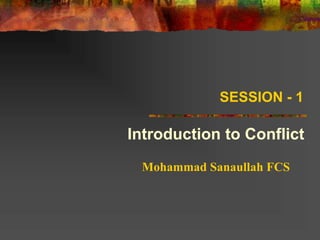
1. introduction to conflict
- 1. SESSION - 1 Introduction to Conflict Mohammad Sanaullah FCS
- 2. Introduction Conflict occurs when individuals or groups are not obtaining what they need or want and are seeking their own self - interest. Sometimes the individual is not aware of the need and unconsciously starts to act out. Other times, the individual is very aware of what he or she wants and actively works at achieving the goal.
- 3. Conflict “An expressed struggle between at least two interdependent parties, who perceive incompatible goals, scarce rewards, interference from the other party in achieving their goals. They are in a position of opposition in conjunction with cooperation.” J. H. Frost and W. W. Wilmot
- 4. “Organizational conflict arises because of rapid and unpredictable change, new technological advances, competition for scarce resources, differences in cultures and belief systems, and the variety of human personalities.” A. M. Barker
- 5. Interterritorial conflict …is conflict that arises among groups within one (health care) institution.
- 6. Interdisciplinary conflict …is conflict among different professions.
- 7. Defiant behavior …is that which challenges the authority of the supervisor or manager through obstinate and intransigent behavior.
- 8. About Conflict Conflict is inevitable; Conflict develops because we are dealing with people’s live, jobs, children, pride, self-concept, ego and sense of mission or purpose; Early indicators of conflict can be recognized; There are strategies for resolution that are available and DO work; Although inevitable, conflict can be minimized, diverted and / or resolved.
- 9. Beginnings of Conflict Poor communication; Seeking power; Dissatisfaction with management style; Weak leadership; Lack of 0penness; Change in leadership.
- 10. Conflict indicators: Body language; Disagreements, regardless of issue; Withholding bad news; Surprises; Strong public statements; Airing disagreements through media;
- 11. Conflict indicators….. Conflicts in value system; Desire for power; Increasing lack of respect; Open disagreement; Lack of clear goals; No discussion of progress.
- 12. Conflict is destructive when it: Takes attention away from other important activities Undermines morale or self-concept; Polarizes people and groups, reducing cooperation; Increases or sharpens difference; Leads to irresponsible and harmful behavior, such as fighting, name-calling.
- 13. Conflict is constructive when it: Meeting must be properly authorized and convened. Adequate notice of the meeting must be given to every person entitled. Meeting must be conducted by a properly appointed Chairman. Prescribed quorum must be present. Meeting must conduct its business as per rules and regulations (Articles) governing the meetings.
- 14. Techniques for avoiding and / or resolving conflict: Meet conflict head on and Set goals Plan for and communicate frequently Be honest about concerns Agree to disagree – understand healthy disagreement would build better decisions Get individual ego out of management style Let your team create – people will support what they help create
- 15. Techniques for avoiding and / or resolving conflict ….. Continually stress the importance of following policy Discuss differences in values openly Provide more data and information than is needed Develop a sound management system.
- 16. Causes Conflict: Defiant behavior Stress Space Physician authority Beliefs, values, and goals Change Organizational climate Leadership style Personal problems
- 17. Causes Conflict …. Age Departmental pressures Increased accountability Discrimination Inadequate orientation Conflicting rules Personal problems
- 18. THANK YOU
